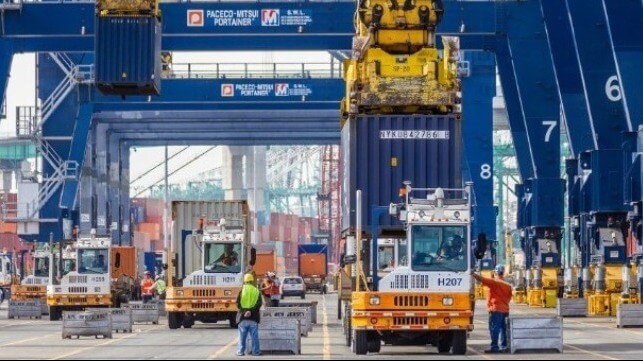Digitalization Breakthrough as Leading Carriers Commit to eBL by 2030

After years of discussion and slow progress toward the digitalization of the documentation used during the transport of cargo, the Digital Container Shipping Association (DCSA) is reporting what it believes is a major breakthrough that will finally see paper copies of the bill of lading fully digitalized. Nine of the world’s largest container shipping lines had all signed a commitment to accelerate the digitalization of container trade using the open-source standards developed by the DCSA.
Switching away from the transfer of physical paper bills of lading could save $6.5 billion in direct costs according to the DCSA and would lead to much broader growth in global trade. The DCSA believes the nine shipping companies, which include MSC, Maersk, CMA CGM, Hapag-Lloyd, One, Evergreen, HMM, Yang Ming, and Zim, will serve as the bellwethers to lead to universal adoption of the electronic bill of lading (eBL) long promised yet still only a concept in the industry.
The association reports that ocean carriers currently issue around 45 million paper bills of lading each year. Despite moves to increase digitalization spurred on by the pandemic, the DCSA estimated just over one percent were electronic in 2021.
Transforming document exchange through the eBL the DCSA argues will accelerate digitalization to benefit customers, banks, customs/government authorities, providers of ocean shipping services, and all maritime supply chain stakeholders. They are citing a recent study by McKinsey that estimates that if eBL gains universal adoption across the industry, it could unlock around $18 billion in gains for the trade ecosystem through faster document handling and reduced human error. The report predicts a $30 to $40 billion growth in global trade through the universal adoption of digitalization.
“The digitalization of international trade holds vast potential for the world economy by reducing friction and, as trade brings prosperity and the eBL will further enable trade, helping bring millions out of poverty,” said Thomas Bagge, Chief Executive Officer of the DCSA announcing the agreement among the carriers. “This heralds the start of a new era in container shipping as the industry transitions to scaled automation and fully paperless trade.”
The nine carriers signed a pledge committing to convert half of the original bill of lading activities to digital within five years. They further committed to 100 percent adoption by 2030.

that matters most
Get the latest maritime news delivered to your inbox daily.
Manual, paper-based processes are time-consuming, expensive, and environmentally unsustainable for stakeholders along complex supply chains says the DCSA. They point out that paper-based processes break down when cargo in ports cannot be gated out because original bills of lading, or title documents, fail to arrive or cannot be manually processed in time.
A non-profit group founded by the major ocean carriers, the DCSA has spent the past few years working diligently to reach this milestone. They are been promoting the development of open source code standards which were developed based on input from carriers. Their mission is to drive systematic collaboration and build cooperation between all the members of the supply chain from carriers and shippers to the ports to reduce trade barriers.
